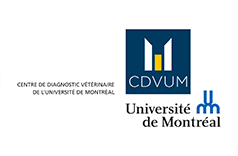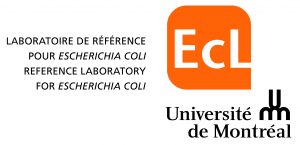The Reference Laboratory for Escherichia coli (EcL) was founded in 1981 by Dr. John Morris Fairbrother, professor in the Department of Pathology and Microbiology at the Faculty of Veterinary Medicine at the University de Montréal. In 2006, the EcL Laboratory was designated as the World Organization for Animal Health (OIE) Reference Laboratory for Escherichia coli.
To view the full EcL Laboratory website, click here
Services offered
See our submission form for detailed profiles
Pathotyping (PCR analysis of the sample)
– Pig (diarrhea)
– Pig (edema disease)
– Cattle (diarrhea or sepsis)
– Cattle (paralyzing gastroenteritis)
– Poultry (colisepticemia)
– Dog and cat (diarrhea)
– Dog and cat (urinary tract)
– Dog (granulomatous colitis)
– Rabbit
– Any species (diarrhea)
– Any species (extra-intestinal samples)
Virotyping (PCR analysis of a strain)
– Toxins (LT, STa, STb, Stx1, Stx2, CNF, EAST1, CDT, Aerobactin, Tsh)
– Fimbriae (F4, F5, F6, F17, F18, F41, P fimbriae, S fimbriae, F1 fimbriae)
– Adhesins (Afa, Eae, Paa, AIDA)
– Poultry (extended profile) (Aerobactin (iucD / iutA), iroN, iss, hlyF, ompT, Tsh, P, CNF, kpsMII, hra, EAST1, cvaC, sitA, ireA, fyuA)
Various PCR analyses (on request)
– Subtyping of F4 variants (ab / ac / ad)
– Subtyping of F18 variants (ab / ac)
– Subtyping of fimbriae P (papA: F7 to F16 and F165) (papG: GI, GII, GIII)
– Subtyping of Stx1 and Stx2 variants
– Phylogenetic group (E. coli A, B1, B2, D, E, F, G)
– Detection / confirmation O157
– Certain O serogroups (ex O1, O2, O26, O45, O78, O103, O111, O121, O139, O141, O145, O147, O149, etc.)
– Certain H (fliC) antigens (ex H7, H10, H43)
O: H serotyping
Now offered only by whole genome sequencing (WGS), see below. This switch to WGS for serotyping is justified by better performance. Thus, the WGS firstly allows the detection of all known O serotypes (O1 to O188, except O14 and O57) in contrast to only 88 serotypes by slide agglutination. In addition, the O is identified in approximately 98% of the isolates tested compared to 79% of the isolates by slide agglutination and the results obtained by WGS are 98% identical to those obtained by slide agglutination. In addition, determination of O serotype in auto-agglutinating isolates (approximately 6% of isolates) is now possible, in contrast to slide agglutination.
Determination of the Minimum Inhibitory Concentration (MIC) by Sensititre
– NARMS Gram Negative CMV4AGNF
– BOPO7F (bovine and porcine)
– AVIAN1F (avian)
– EQUIN1F (equine)
– COMPGN1F (pets)
– CMVAMAF (bovine mastitis)
– ESB1F (extended spectrum beta-lactamase)
Whole genome sequencing (WGS) (all species)
The information obtained by WGS enables the identification and characterization of isolates with precision and speed. Taken together, this information allows a better determination of the pathogenicity potential of the isolates and the evaluation of their zoonotic potential.
Thus, the detailed WGS analysis report * includes:
– bacterial genus and species,
– pathotype (ex ETEC, STEC (VTEC), ExPEC, EPEC, APEC, etc.)
– phylogenetic group,
– ST (MLST)
– O:H serotype,
– virotype (based on the search of more than 300 virulence genes),
– predicted profile of resistance to antimicrobials and disinfectants (based on the search of more than 2000 resistance genes and their variants and / or mutations conferring resistance),
– a phylogenetic tree comparing your isolate with reference isolates from the same species (when available).
* Raw sequences (in fastq and fasta format) can be supplied on request.
In addition, on request and under certain conditions, a personalized analysis according to your specific needs (e.g. assistance in the formulation and monitoring of autogenous vaccines (autovaccine), tracking of isolates from the same clonal lineage in the event of an outbreak) can be carried out.
Collection of Escherichia coli strains
EcL Laboratory’s Escherichia coli strain collection includes more than 10,000 E. coli strains isolated since 1981 from clinical cases of different animal species.
The EcL Laboratory also has a collection of different E. coli reference and PCR control strains, available on request.
Animal species of origin:
Pig, Cattle, Avian (Chicken, Turkey, Duck), Sheep, Goat, Equine, Rabbit, Dog, Cat, wild animals, exotic animals.
Organs:
Ileum, colon, faeces, liver, lung, heart, pericardium, yolk sac, air sac etc.
Observed clinical signs or diseases:
Diarrhea, sudden death, edema disease (pig), hemorrhagic dysentery (bovine), colisepticemia (avian), aerosacculitis (avian), urinary tract disease (dog, cat), sepsis, omphalitis (avian), paralyzing gastroenteritis (bovine), granulomatous colitis (dog), presence in extra-intestinal organs.
Available pathotypes:
– Enterotoxigenic E. coli (ETEC)
– including ETEC: F4, ETEC: F18, ETEC: F5, ETEC: F41, ETEC: F17, etc.
–E. coli producing Shiga toxins (STEC) or verotoxinogenic E. coli (VTEC)
– including enterohemorrhagic E. coli (EHEC) and edema disease E. coli (EDEC)
– Enteropathogenic E. coli (EPEC)
– Extra-intestinal E. coli (ExPEC)
– including avian E. coli (APEC), uropathogenic E. coli (UPEC), and septicaemic E. coli (SEPEC)
– Enteroaggregative E. coli (EAEC)
– Other specific pathotypes on request (CDEC, DAEC, etc.)
To obtain one or more of these strains, the University of Montreal requests the signing of a Material Transfer Agreement (MTA), which stipulates that the strain (s) must be used for research purposes only. and that they must not under any circumstances be used for other purposes or given to a third party without written authorization from the University of Montreal. In addition, proof of the compliance of your facilities and operations equivalent to a level of biological containment 2 from your government or institutional body will be required.
In addition, you may need to apply for an import permit if this is an international shipment.
Our team
Maud de Lagarde, DVM, DACVIM, PhD
Assistant professor
maud.de.lagarde@umontreal.ca
450-773-8521, ext. 14932
Dre Ghyslaine Vanier, PhD
Laboratory professional
ghyslaine.vanier@umontreal.ca
450-773-8521, ext. 8304

